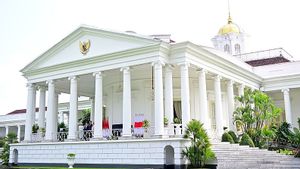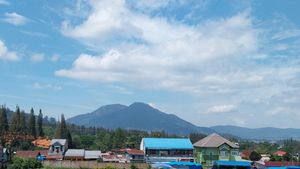JAKARTA - Since the 1990s, the South Korean entertainment industry has invaded the world, including Indonesia. This success is known as the Korean Wave or Hallyu. The Korean Wave not only popularized Korean culture, but also brought a new standard of beauty to the world.
This standard makes Korean celebrity-style beauty a role model for citizens of the world. They use Korean beauty products to the extreme: plastic surgery. The Korean Wave is the main locomotive for exporting Korean culture abroad.
A series of cultural exports that extend through the impressions of Korean dramas (drakor). Dramatic impressions began to fill television broadcast hours in many countries. Asia, for example, a series of countries from Hong Kong, Singapore, Vietnam to Indonesia have become Drakor's main market since the 1990s.
The Korean Wave's interest was even higher when Drakor Full House (2004) was first screened outside of Korea in 2004. The trend of Drakor Full House immediately became a mandatory spectacle for young people at that time. In fact, one television station in Indonesia has played five dramas about contract marriages.
It is thanks to the love for Full House that many young people are then interested in exploring all kinds of Korean culture that exist in drakor. "The lighter is a Korean drama series aired on private television stations. The drama series Full House in 2004 which also aired here."
"The film is the beginning of the trigger for young people's passion for Korean pop culture. The names of the stars, such as Bi or Rain and Song Hye-kyo, also become familiar to the ears," said Tito Sianipar in his writing in Tempo Magazine entitled Tergila-gila All Korea (2019).
Korean pop music (K-Pop) is also the same. The songs sung by Korean boybands and girlbands are quickly crazed by the younger generation. The reason is none other than because K-Pop songs often raise the problems and emotional dilemmas of teenagers.

Girlband performing at the 2015 Korean Wave Fashion Festival (Source: Wikimedia Commons)
In addition to liking the song, Kpop fans also like singers who are identically called Korean idols. These idols can also come from boyband members, girl groups or solo singers. Love is also covered by a variety of reasons.
There are those who like idols from their characters, there are also those who like idols because they look attractive with white, beautiful, cute, thin, and tall skin. The love for idols is what makes their fans love various things related to Korean culture, from skin care to snacks.
The most obvious example is the flooding of the world's shopping centers with Korean imported cosmetics. What's more, Korean foods such as kimci, noodles, and mocha also fill the shop windows across the country. The strength of the Korean Wave itself is getting stronger because the South Korean government intervened in developing the popularity of Korean idols.
Not only financial support for creative filmmakers, the South Korean government in the smallest example has polished the shooting location of an idol video clip as a popular tourist attraction. The appreciation then further popularized Korea in the eyes of the world.
“Korea, on the other hand, took a different path: conquering through its consumption products, not by its power. A generation ago, Korea was a growing market. Now, however, people think of Korea as Santa Claus."
"In Asia, people think, 'Koreans are the ones who bring so many cool products to our market.' Koreans are not considered as economic invaders - buying natural resources, acquiring monuments, or imposing their cultural influence," Euny Hong writes in the book. Korean Cool: The Innovative Strategy Behind the Korean Pop Culture Explosion (2016).
Korean beauty standard
Without realizing it, the Korean Wave invasion also brought a new beauty standard, namely Korean Beauty (K-Beauty). The presence of celebrities and beautiful idols from various girl groups is the estuary.
Their perfect appearance with white skin, beautiful face, slim, and ideal height are admired by their fans. This admiration secretly arose a desire for his fans to have the appearance of a Korean idol.
Various ways are then tried by young women. Some of them are by raiding all kinds of beauty products from Korea. Even more extreme, many are willing to look like their idols by doing plastic surgery.
Those who are not so satisfied with natural beauty, then choose to do plastic surgery in order to get smooth white skin, small face, wide eyes, and tiny nose.
"If you think that Lady Gaga is now more beautiful than her early appearance as an artist, it means that you are secretly still shackled by the myth of the beauty of women called beauty. Or Korean drama addicts, with cool, (handsome) and beautiful artists, with the issue of facial surgery being no longer taboo because their beauty is seductive."
"At least this shows that there is a standard of beauty for women who have gone global in the entertainment world that has infiltrated the imagination of young girls in all corners of the world," concluded Embun Kenyowati Ekosiwi in the book Pergulatan Etika Indonesia (2019).

The popularity of Korean-style plastic surgery proves that white skin is still a dream for almost all citizens of the world. At the same time, Korean women's white skin still implies a sense of inferiority. As a result, many women want to be as beautiful as Korean women.
This fact is due to the fact that many countries, especially Asia, think – because many were colonized by foreign nations – white skin is a sign of social class. Bright white skin is not only a symbol of beauty, but an important asset for a woman. Even Korean idols indirectly re-elevate the image of whites as a high class as under by European colonialists.
"White porcelain is considered a necessary virtue for beauty in South Korea. This can be traced back to the fact that white skin has traditionally been a status symbol. South Korea was once an agricultural society, where the privileged classes didn't work hard under the sun and , as a result, have whiter skin," said Korean beauty analyst Kim Ching-Kyung as quoted by Nikkei Asia.
*Read other information about HISTORY or read other interesting articles from Detha Arya Tifada.
Other MEMORIESThe English, Chinese, Japanese, Arabic, and French versions are automatically generated by the AI. So there may still be inaccuracies in translating, please always see Indonesian as our main language. (system supported by DigitalSiber.id)










